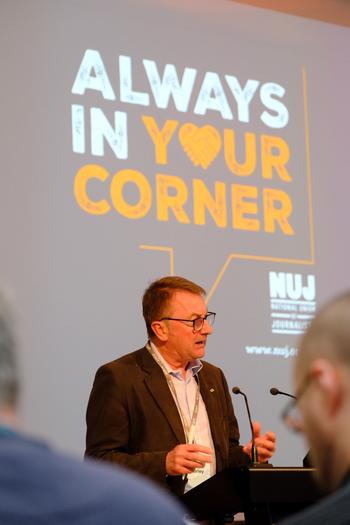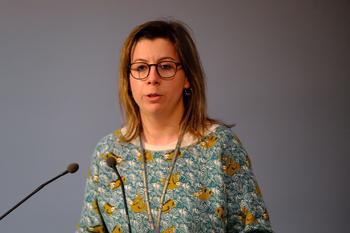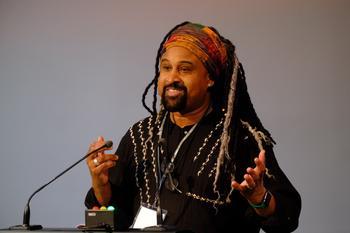DM2023: wages, payments and conditions
Conference debated and agreed motions committing to campaign for improved members' pay and terms and conditions.

Delegates heard from Chris Morley proposing composite A about successful strike action at Reach last year. Morley recognised the mechanics in organising the strike ballot to 1000 members in the company, leading to increases between 14 and 44 per cent on minimum rates. Morley said “I particularly want to thank those freelances who showed solidarity to not make themselves available to strike break on that day. Your sacrifice was noted and appreciated.”
Motions applauded NUJ members at Reach and the Reach Group Chapel for winning a better pay deal through last year’s strike action. The first ever group-wide action at Reach had helped achieve £2million for lower paid members and had been a successful recruitment opportunity for the union.
Richard Palmer, speaking on behalf of the NUJ’s NEC said “last year was the NUJ’s finest hour’ as he reflected on the dispute and all it achieved in building foundations for the future. Delegates passed the composite instructing the NEC to put pay at the centre of campaigning this year and next and use the dispute as a case study in future recruitment materials.
A late notice motion passed at DM expressed dismay at the hundreds of journalists’ jobs at risk of redundancy at Reach. It noted how executive directors and shareholders in plcs including Reach have been favoured for available cash generated, at the expense of staff. DM agreed the union would campaign to reverse the trend in media companies.
Conference supported motion seven calling on the NEC to publish an updated ‘Organising to Win’ pamphlet before the next DM.
Darach MacDonald, Derry North West Ireland branch, urged the union to renew a proactive campaign for improved terms and conditions. He proposed motion eight instructing NEC to be proactive in campaigning for inflation linked pay rises, enhanced working conditions and support for mental and physical health affected adversely by austerity. The motion recognised the ongoing impact of the cost of living crisis leaving some members dependent on the use of food banks. Motion was carried.

Motion nine focusing on pay equality and tabled by the Equality council was carried. Cristina Lago, speaking on behalf of the council expanded on the motion commending the NUJ’s pay campaign providing appropriate tools to support branches build successful campaigns. She said “Not disclosing salary or rates in adverts and expecting job applicants to negotiate their pay, often during a job interview, can perpetuate unequal pay between women and men, and continue widening the ethnicity and disability gaps.”
The motion criticised the lack of transparency around job salaries often advertised as ‘competitive’ or similar, instead of publishing salaries. Conference instructed the NEC to campaign for salary transparency and work with union structures to encourage publication of pay gap data not currently required by law.
Motion ten tabled by Magazine and Book Industrial Council and amended by Disabled Members’ Council was carried. Bill MacKeith, proposing the motion quoted TUC research revealing nine out of ten disabled workers who worked from home during the pandemic wanted to continue doing so. Ann Galpin speaking on behalf of the Disabled Members’ Council about their amendment replacing ‘workers with disabilities’ with ‘disabled workers’ said “the language we use across our unions and workplaces matters.”
The motion was carried and instructed the NEC to continue promotion of the NUJ’s efforts providing necessary support and resources by ensuring funding of up to £20,000 was available to councils, branches and chapels undertaking this work.

Roger McKenzie, Newspapers and Agencies Industrial Council, proposed motion 11 about the increase in journalists required to work from home since the coronavirus pandemic, and the financial burden resulting from this during the cost of living crisis. McKenzie said “Many of our members were struggling to make ends meet before covid.” “They are struggling to keep bread on the table and a roof over their head” McKenzie highlighted that employers were too often pushing costs onto members. Conference passed the motion instructing the NEC to campaign to increase working from home payments in line with rising costs of living, and to gather information on various home allowances in existence across the country.
Motion 12 from the London Independent Broadcasting and New Media branch focused on the risk home working may have on further outsourcing in the media industry to cut costs. The motion was carried, with the NEC instructed to renew its fight against outsourcing.
The pernicious use of digital “hits” to measure journalists’ performance has led to unacceptable levels of workplace stress and poorer quality of reporting as it encourages headline-grabbing celebrity stories which are squeezing out public interest journalism, conference was told.
Bob Wade, from Birmingham & Coventry branch, said people’s careers were being linked to the number of hits and page views their stories generated and this had led to a dumbing down of stories and it put a huge amount of stress on journalists.
Gill Oliver, from Oxford branch, said when she worked for Newsquest’s Oxford Mail she had felt really under pressure at a newspaper that seemed permanently in crisis mode because understaffing meant journalists were working way beyond the end of their shift. “I saw people in tears and people signed off with stress,” she said. She said the union had to make a stand against Newsquest and all the other employers who do this and expose exactly what is going on in newsrooms.
The union’s industrial councils will now continue their opposition to individual click targets, and mount a high-profile campaign to stamp out unacceptable working conditions, including routine overtime in newsrooms.
A World Service motion took up the problems associated with night working. The anti-social hours have been shown to contribute towards ill health, with night workers becoming more susceptible to heart disease, some forms of cancer, depression and obesity. Another hazard reported is traffic accidents when tired workers drive home after a shift.
Alex Ritson, World Service, said while journalists understood that news never stops, they are only human at the World Service and working night shifts came with risks to health. “We are asking that employers show more respect to shift workers and take action to reduce the risks to health associated with night working.”
Adam Lindsey, BBC London branch, said anti-social shifts were most likely to be carried out by people who can’t say no. “I’ve struggled with my health,” he said, “but at least I am now in the position to say no. Not everyone can do that. Putting a worker’s health first is critical.”
Conference agreed to a campaign to champion the rights and conditions of night workers, with older workers being given the right to opt out, sanctioned breaks for naps in dedicated sleeping areas, facilities such as canteens normally provided to day workers to be available and shorter shifts and increased pay rates.
